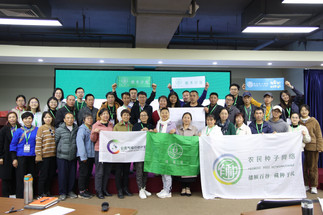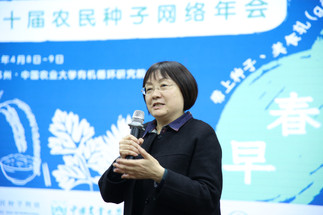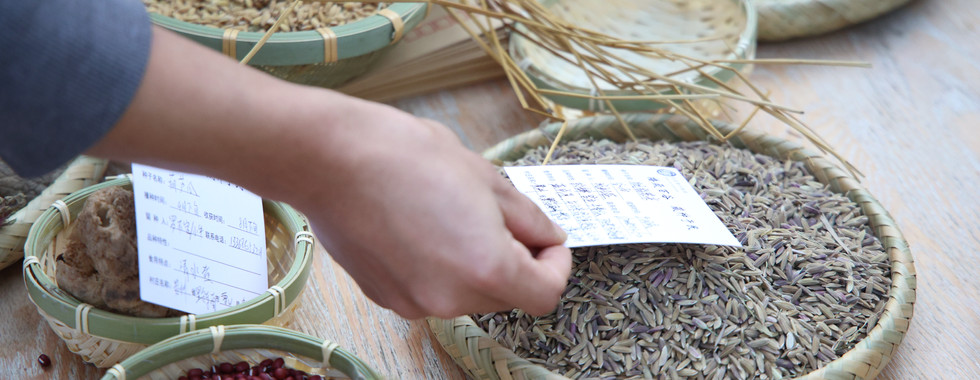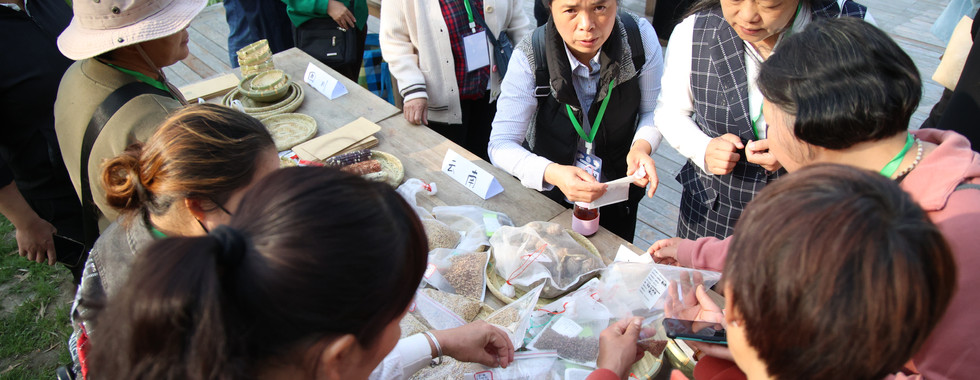
On April 8-9, 2023, the Farmer Seed Network held its 10th annual conference in Suzhou. The conference was organized by the Farmer Seed Network, co-organized by the Organic Recycling Research Institute of China Agricultural University (Suzhou) and the Shitong Society, and supported by the Hong Kong office of Oxfam. Nearly 100 participants from all over the country attended the conference, including community leaders, ecological farmers, university scholars, agricultural and rural bureau officials, and grassroots breeders. The Farmer Seed Network hopes to provide a platform for guests to share their seeds, food, and cases, and to jointly explore how to protect and sustainably utilize our biodiversity, and to support green agriculture development and rural revitalization.
Day 1
Li Ji, the Dean of the Organic Recycling Research Institute at China Agricultural University (Suzhou), delivered the opening speech at this year's conference. He briefly introduced the current situation of the Organic Recycling Research Institute and called for attention to soil health and high-quality seeds and food.

Song Xin from the Farmers' Seed Network (FSN) reported on the review and exhibition of the network's work in 2022. The network's ecological breeding trials and special trials on beans, "Small Beans, Big Health," have accumulated rich experience for the sustainable use of local varieties. Two seed training sessions in Kunshan and Nanning have connected everyone together. In addition, the Farmer Seed Network also participated in the second phase of the United Nations Framework Convention on Climate Change (COP27) and the Convention on Biological Diversity (COP15), and showcased Chinese cases with domestic social organizations, media, and peers in the industry.

Wang Qian from the Global Environmental Institute provided a detailed interpretation of the Kunming-Montreal global biodiversity framework and the progress of non-state actors in assisting biodiversity conservation. The global biodiversity framework, established around the "theory of change," sets mid-term and long-term goals for 2030 and 2050, with actions and results as the guiding principles. Many of these goals are closely related to the work of the Farmers' Seed Network, including the protection and utilization of food and agricultural genetic resources.

The first discussion was centered around "Community-based protection of crop genetic resources in their natural habitat." Liu Xiting from Muyunpo shared how the local resources of the threshing seed bank were fully utilized, combining traditional culture and the villagers' needs for public activity spaces, and promoting the establishment of an executable operating management system. Yu Jiangang from "Meiheyu" shared his motivation and cultural identity for returning to his hometown, the path and criteria for living preservation, and the flash projects and food and agriculture writing he organized for traditional food. Faced with challenges such as village demolition and the disappearance of traditional family farms, Yu Jiangang hopes to rebuild a sustainable agricultural and rural cultural system through efforts. Lu Ruixiang from the source of the world's millet in Aohan Banner shared how local seed companies promote the protection of Aohan Banner's grain varieties with the community. Lu Ruixiang hopes to develop an agricultural system of planting and breeding cycles, conserve old seeds, and conduct variety adaptability tests. Ni Yongwang, a young returnee from Leigongshan Queqiaomiaozhai, shared the Queqiao Slow Friends Family Ecological Farm operation and promoted the Guizhou local "Half-Grain Cooperation" rice old seed exchange network through cross-border cooperation to spread agricultural wisdom to the public.
At the end of the first discussion, Zhang Zongwen from the Beijing office of the Alliance of Biodiversity International and the International Center for Tropical Agriculture discussed the current situation and trends in protecting China's agricultural genetic resources. Zhang praised the work of the farmer seed network and the dynamic preservation of old seeds. He stated, "in the process of protection, we are also using and selecting, constantly breeding varieties to adapt to the improvement of nutrition and food, which can effectively help rural development." Zhang also reminded us to pay attention to the new policies recently released by the country regarding the protection and certification of local germplasm resources, which can serve as important proof of ownership in the future.
The second discussion focused on "Case Studies of Agricultural Seed Utilization from Farm to Table". Xiaoyun Sheng from the Beijing Organic Farmer's Market shared the possibility of revitalizing the organic farming market. Xiaoyun compared the different perspectives of consumers, producers, and researchers, and suggested that farmers should return to the perspective of consumers in the process of marketization, focusing on whether the products are edible, tasty, easy to prepare, and available for purchase (including delivery). At the same time, Xiaoyun emphasized the advantages of face-to-face communication in offline farmer's markets, particularly for promoting non-standardized traditional varieties. Chen Ziyu from the Wocuiyuan Ecological Farm shared their experience of introducing old varieties of crops to the market through ecological cultivation. Despite facing various difficulties, Wocuiyuan still adheres to the story of planting traditional varieties. Chen expressed gratitude to the Beijing Organic Farmer's Market, where consumers and farmers built mutual trust and braved all kinds of weather to meet each other. Li Zhi from the Root Farm shared the story of connecting consumers with old varieties of sprouts. Root Farm uses organic methods to plant sprouts such as soybean sprouts, mung bean sprouts, and pea sprouts, which are popular in the market. Wu Xiangxing from Sanniangwan Village in Qinzhou City, Guangxi Zhuang Autonomous Region shared the story of introducing "new" varieties of crops into school gardens and promoting agricultural education for local students through community efforts.
In the final discussion of the second session, Chang Tianle from the Foodie Society reviewed the theme of how to integrate agricultural varieties into the ecological agricultural value chain. Professor Chang discussed the consistency and heterogeneity of varieties, and whether to compromise layer by layer for the different pursuit of consumers. She believes that if our positioning is our ideal way of life, although we may not earn as much money as we want, we can still live the life we want and stick to our simple original intention, which is also self-consistent.
The third discussion was a special topic discussion on ecological seed certification. David Gould, the Seed Platform Officer of the International Federation of Organic Agriculture Movements, shared the organization's position and experience in ensuring the supply of organic seeds and protecting farmers' rights from various aspects. Xu Qian from Beijing Aikesai Certification Center Limited shared the certification standards for rural ecological seeds and ecological products. Xu Qian believes that combining old varieties and ecological agriculture is a good way to find a way out for the sustainable use of rural seeds through farmers' certification of ecological seeds and products. Zhao Jianshe from Henan Zhongyuan Organic Agriculture Research Institute shared the production and certification of organic vegetable seeds in Henan, how the institute promotes the protection of local varieties, and the organic seed plan. Wang Rui from Beijing Organic Farmer's Market shared his experience and thoughts on Participatory Guarantee System (PGS) practice.
In the final discussion of the third session, Professor Qiao Yuhui from the College of Resources and Environmental Sciences at China Agricultural University gave his evaluation on the theme of the review and prospect of China's organic agriculture and organic seed system. Professor Qiao pointed out the huge gap between the number of organic certifications (25,000) and organic seed certifications (45) and the opportunities naturally within this gap. He believes that local seeds are most suitable for organic seed production and that their planting process should be considered. Ecological agriculture and the conservation of old seeds complement each other and should be allowed to reach their full potential in a natural state.
On the first evening, Wang Hao from the Foodie Society and Shen Ye from the Farmer Seed Network organized a free forum with the theme of Agriculture and Climate Change - Perception, Impact and Response. Farmers from all over the country were divided into five groups based on their regions, discussing the problems encountered in recent years due to climate change, the measures taken, and the difficulties. During the discussion, farmers learned from each other about different methods of dealing with climate change, and we also saw the impact of climate change across the country.
Day 2
Exploration and Debate
In the morning, we analyzed the specific connotations and practical paths of biodiversity conservation and utilization from scientific and local government perspectives, focusing on multiple population angles.
Cheng Chen from the Shanshui Conservation Center interpreted the 2030 biodiversity goals proposed by the Kunming Framework, fully affirming the small and beautiful family model, and calling on everyone to work together in agricultural production and seed protection, turning risks into opportunities. Liu Qianqian from West Lake University showcased the team's latest agricultural and forestry research progress and introduced ecological monitoring technology based on artificial intelligence. Zou Yi from Xi'an Jiaotong-Liverpool University introduced the team's research on quantifying biodiversity, using solid data to demonstrate the close relationship between increasing biodiversity and ecological agricultural practices in a certain region.
Subsequently, the staff of various grassroots agricultural bureaus shared their experiences in local farming practices and seed protection. He Xianlin introduced the dryland terrace system in Shexian, Hebei, emphasizing the importance of stimulating farmers' intrinsic motivation. Feng Eryong and Li Qing introduced the protection work of Qiongzhong Shanzilan rice and Hani terrace red rice. Wang Chengfa introduced the collection and protection of local varieties in Kaihua County, Zhejiang. They have been involved in agriculture for decades, demonstrating the role of local governments as guides in promoting ecological agriculture practices and a variety of protection work.
Embrace nature, seed exchange
On the afternoon of April 9th, everyone took a bus to Kunshan Yufengdao Organic Farm, 43 kilometers away. Located adjacent to Yangcheng Lake, the farm was full of vitality as soon as the gate was entered. Guided by Mr. Tang (Tang Yaozhong), everyone walked on the slate road, embracing the gifts of ecology. When they arrived at the wooden house, they tasted the white jade glutinous rice cakes, made from the local rice variety Su Yu Nuo, rolled in local soybean powder, and drizzled with brown sugar syrup, which refreshed their tired taste buds. This was a special booth set up by Yufengdao Organic Farm for the "Little Bean, Big Health" project supported by Vanke Foundation in this event, showcasing the rich variety of bean species and bean-based dietary culture that the farm conserves to farmers and consumers. The diverse bean species and fragrant glutinous rice cakes and soybean powder attracted the attention and taste buds of consumers who came to play on the weekend.
At the same time, participating farmers were enthusiastically exchanging seeds. Tian Milin led everyone from Suzhou to Xishuangbanna, then to Guizhou, passing through Guangxi, Henan, and Hebei, finally arriving in Inner Mongolia. The farmers vividly recounted their stories with seeds and exchanged not only seeds but also promises of friendship, trust, and mutual benefit.


























































































